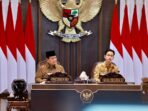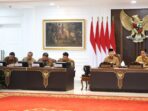Indonesia is currently grappling with a significant economic challenge: the continuous drain of national wealth. A large portion of the country’s economic prosperity is being hoarded and used outside of its borders. The analogy of wealth being like blood for a body is apt in this situation as Indonesia is experiencing financial hemorrhaging that has been ongoing for decades, dating back to the colonial era.
During the Dutch East India Company (VOC) era, the outflow of wealth from Indonesia was glaringly obvious, prompting resistance from the Generation of ’45. The VOC, being the most valuable company in economic history, accumulated profits from the Indonesian region but kept them in the Netherlands. Today, although the situation may not be as overt as it was in the past, the leakage of Indonesia’s wealth continues. Many Indonesians are unaware or choose to remain silent about this issue, allowing the outward flow of wealth to persist.
Various economic indicators can track the drain of Indonesia’s wealth abroad, such as the trade balance and ownership structures of exporting companies, as well as deposits in foreign banks. Upon analyzing export-import records from 1997 to 2014, it was found that the reported amounts of exports may not accurately represent the true value of exports. Export misinvoicing, or errors in recording export values, leads to significant leakage of wealth out of the country.
The Finance Minister revealed in 2016 that around IDR 11,400 trillion owned by Indonesian entrepreneurs and companies was held overseas, amounting to five times the national budget. Foreign companies operating in Indonesia also profit significantly but keep their earnings abroad. This practice, along with Indonesian entrepreneurs storing and transferring profits overseas, hinders economic development within Indonesia.
The outflow of Indonesia’s wealth has been a systemic issue for centuries, as emphasized by leaders like Sukarno, who addressed similar concerns in the past. The continual drain of wealth from Indonesia inhibits economic growth, keeps basic necessities prices volatile, and marginalizes the poor. The lack of transparency and action from Indonesian elites regarding this issue further exacerbates the situation.
Addressing this fundamental problem of the net outflow of national wealth is crucial for Indonesia’s economic prosperity and stability. Without retaining wealth within the country, economic development and progress will remain stagnant. Repatriating funds parked abroad and ensuring that profits from exports benefit Indonesia are essential steps towards building a stronger and more prosperous nation.





